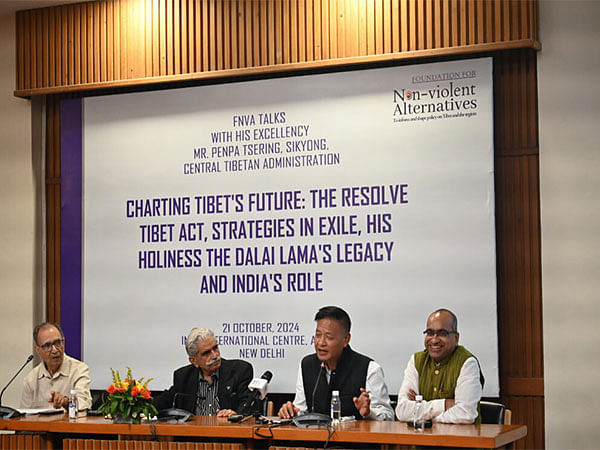New Delhi [India], October 22 (ANI): Sikyong Penpa Tsering of the Central Tibetan Administration (CTA) delivered a keynote address at the India International Centre Annexe on Monday, discussing Tibet’s future amid China’s growing influence in the region.
The event, titled “Charting Tibet’s Future: The Resolve Tibet Act, Strategies in Exile, His Holiness the Dalai Lama’s Legacy, and India’s Role,” was hosted by the Foundation for Non-violent Alternatives (FNVA) and featured prominent speakers, including Om Prakash Tandon, Major General Ashok Kumar Mehta, and former Lok Sabha member Sujeet Kumar.
During his address, Sikyong Penpa Tsering underscored the critical importance of the Resolve Tibet Act and the Tibet Policy and Support Act in the ongoing fight for Tibetan rights and autonomy. He explained that these legislative frameworks are essential for holding the Chinese government accountable for human rights violations in Tibet.
According to Sikyong, “These acts play a crucial role in advocating for the rights and autonomy of the Tibetan people,” emphasising their global significance.
The Tibetan plateau’s strategic importance, known as the “Roof of the World” and “Asia’s Water Tower,” was another key focus of the discussion. The plateau is the source of vital rivers, including the Yarlung Tsangpo and Mekong, which sustain millions of people across Asia.
Sikyong voiced concerns over China’s diversion of these water resources, warning that it endangers not only the environment but also the livelihoods of downstream nations, including India and Southeast Asian countries. He condemned China’s refusal to share hydrological data, calling it a “significant concern,” and called for greater transparency to prevent environmental disasters.
In addition to environmental challenges, Sikyong addressed long-standing misconceptions about Tibet’s sovereignty. He clarified, “Tibet maintained self-rule after expelling Chinese forces in 1912. No foreign country has ever directly ruled Tibet,” firmly countering narratives that seek to diminish Tibetan autonomy. This was a key point in his efforts to reshape global understanding of Tibet’s history and its political struggle.
Sikyong also criticised the Chinese Communist government’s mismanagement of Tibetan rivers, describing it as a threat to both the region’s ecology and the livelihoods of millions. He emphasised the urgent need for sustainable practices, stating that immediate attention is required to protect these vital water resources.
The event concluded with a question-and-answer session, offering participants the chance to engage with speakers on Tibet’s political situation and the CTA’s strategies.
Overall, the session highlighted Tibet’s pressing concerns and the CTA’s commitment to safeguarding its future, with a call for international support and sustainable solutions for Tibet and its people. (ANI)
This report is auto-generated from ANI news service. ThePrint holds no responsibility for its content.



